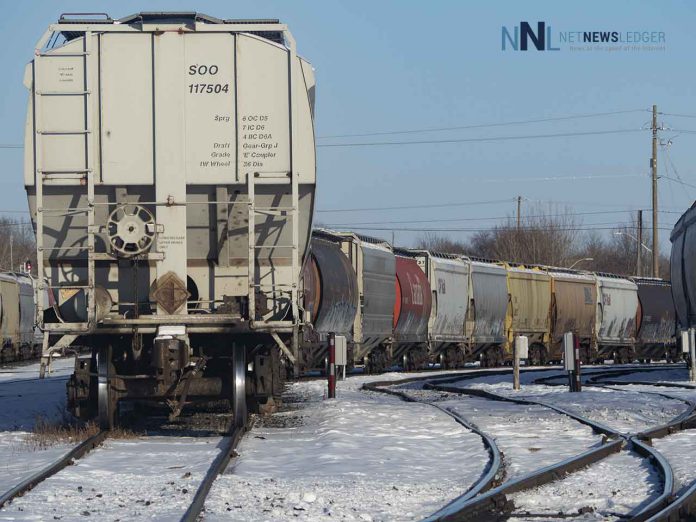Manitoba Premier Brian Pallister sent an email this week to Tory supporters entitled: “These illegal blockades.”
“You’ve probably heard about the highway and rail blockades happening across the country,” Pallister wrote in the Thursday evening message, “including the one right here in Manitoba.”
Echoing actions in Ontario and Quebec, demonstrators had blocked commuter and freight travel west of Winnipeg to protest the RCMP removal of Wet’suwet’en hereditary chiefs and activists challenging the construction of a gas pipeline in northern B.C.
Pallister announced Wednesday his government would seek a court injunction to remove the Manitoba protesters from the rail line. By 2 p.m. Thursday, though, CN Railway had received approval of its own injunction and the occupation was ended.
Still, Pallister sent out his email four hours later.
“We respect the rights of protesters,” it proclaims. “But laws need to be applied.”
The message goes on to criticize Manitoba NDP Leader Wab Kinew for supporting “those behind the blockades,” alongside signing the “‘Leap Manifesto,’ a radical document calling for the shutdown of Canada’s entire resource sector!”
Actors, activists, and musicians launch the Leap Manifesto outlining a climate and economic vision for Canada during a press conference in 2015.
For the record, the Leap Manifesto is an apolitical document created in 2015 by more than 60 Indigenous, social welfare, food, environmental, labour, and faith-based (mostly Christian) organizations, and committed to by more than 52,000 celebrities, activists, and Canadians.
The document is “a call for a Canada based on caring for the Earth and one another,” and asks signees to commit to honouring treaties, building locally-based energy infrastructure, and supporting immigrants and workers to enter environmentally-friendly sectors. It also calls on governments to fund “caregiving, teaching, social work, the arts, and public-interest media,” a national child-care program, and institute a universal basic income.
In fairness, the manifesto also calls for an end to fossil fuel subsidies, creation of a carbon tax, cuts to military spending, and adopting a national “polluter pays” principle.
So it isn’t “a radical document calling for the shutdown of Canada’s entire resource sector,” but rather a political vision running counter to the Tory premier’s.
(Also, for the record, Kinew has tweeted some support for the Wet’suwet’en, but not much; no doubt complicated by the Manitoba NDP’s relationship with B.C.’s NDP government.)
The conclusion of Pallister’s email to party supporters, however, shows its true purpose.
“We won’t stand back while two-tier justice happens in our province. And we won’t hesitate to seek an injunction in the future, if this happens again. If you’re with us, please consider making a donation to help us stand up for ordinary Manitobans.”
Pallister’s monetization of Indigenous v. non-Indigenous conflict in Canada has to mark a new low. In the past, he’s alluded to Indigenous peoples being “night hunters,” scary downtown Winnipeg threats, or “lobby groups.”
His characterization of Indigenous activists as lawless illegals working in opposition to “ordinary Manitobans” — a wild West, with him as the sheriff — is divisive, exploitative, and irresponsible.
The conflict with the Wet’suwet’en over the Coastal GasLink pipeline is fairly straightforward. Canada and B.C. are acting like they own Wet’suwet’en land, make the laws which govern their relationship, and no one is allowed to disagree.
The Wet’suwet’en hereditary chiefs say otherwise. They claim 22,000 square kilometres since “time immemorial,” and are backed-up by the 1997 Supreme Court decision on the Delgamuukw case — which not only recognized their land title but their leadership of the Wet’suwet’en Nation (not the chiefs and councils imposed by the Indian Act).
The Supreme Court told Canada over two decades ago it had to negotiate with the Wet’suwet’en. It has not happened.
Instead, the gas pipeline was planned and approved. To fulfill Canada’s constitutional obligation to “consult” with First Nations, B.C. offered Indian Act chiefs and councils “benefit agreements” (jobs and money).
Benefit agreements are not consent. They’re mostly payoffs meant to appease Canada’s own laws while Indigenous laws, land claims, and governments are ignored.
This is how Canada has operated for a century-and-a-half.
Activists standing on rail lines aren’t lawless. They’re reminders of the laws, land claims, and governments Canada has ignored to build a country.
Pallister, by threatening injunctions, is the one favouring one set of laws over another.
This is the kind of message that divides and exploits Manitobans, conditioning them to see Indigenous peoples as operating against society.
It isn’t true.
 Niigaan Sinclair
Niigaan Sinclair
Originally appeared in the Winnipeg Free Press on February 14, 2020. Republished with the permission of the author.
The views, opinions, and positions expressed by all columnists and contributors are the author’s alone. They do not inherently or expressly reflect the views, opinions and/or positions of NetNewsLedger.







